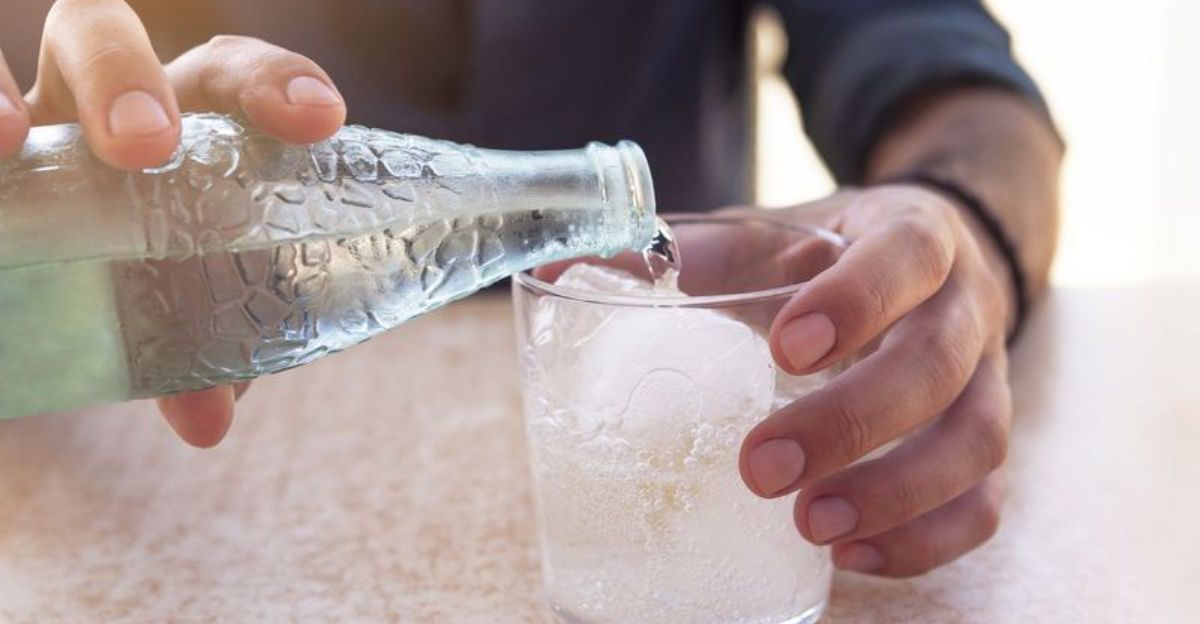10 Flavored Sparkling Waters That Could Be Harming Your Health

Sparkling water has become a popular alternative to sugary sodas, but not all fizzy drinks are the same. Many store-bought flavored sparkling waters hide concerning ingredients behind their refreshing bubbles and fruity flavors. From artificial sweeteners to questionable preservatives and even harmful chemicals, these seemingly innocent beverages might be doing more harm than good.
Sparkling Ice: Sweet Deception in a Bottle
Those vibrant colors in Sparkling Ice aren’t from real fruit—they’re artificial dyes linked to behavioral issues in children. The zero-calorie promise masks its dangerous secret: sucralose, an artificial sweetener associated with inflammation and metabolic disruption.
I switched to these thinking I was making a healthier choice, only to discover I was essentially drinking liquid chemicals! The combination of synthetic sweeteners and colors creates a potentially harmful cocktail that outweighs any calorie-saving benefits.
Aldi’s PurAqua Sparkling Frost: Budget-Friendly But Body-Costly
Saving money shouldn’t cost your health. PurAqua Sparkling Frost might be wallet-friendly, but its ingredient list reads like a chemistry experiment gone wrong. The sucralose and preservatives contribute to potential inflammation and metabolic disruptions.
Once during a summer picnic, I grabbed a case thinking I’d found a bargain alternative to premium brands. My headache an hour later suggested otherwise!
These zero-calorie options may trigger sugar cravings and digestive discomfort, making them counterproductive for health goals.
Topo Chico Flavored Sparkling Water: “Forever Chemicals” in Every Sip
Trendy doesn’t always mean healthy. Topo Chico’s flavored waters gained notoriety after Consumer Reports found concerning levels of PFAS—”forever chemicals” linked to immune suppression and increased cancer risk.
While the company reformulated in 2021, questions remain about trace amounts still present. The hip glass bottles and real fruit juice claims can’t wash away the potential health implications of these persistent chemicals that accumulate in your body over time.
LaCroix: The Instagram Darling with a Dark Side
Behind those pretty pastel cans lurks a troubling secret. LaCroix contains PFAS, according to Consumer Reports testing, chemicals associated with cancer and immune system problems. The vague “natural flavors” label provides convenient cover for ingredients that might cause sensitivities.
My friend swore by these during her diet, unaware that the trendy cans contained potentially harmful compounds. While zero calories might benefit your waistline, the presence of PFAS and mysterious flavoring agents raises serious questions about long-term health impacts.
Polar Seltzer: Excessive Carbonation Meets Chemical Concerns
Those aggressive bubbles might be doing more than tickling your nose. Polar Seltzer’s intense carbonation can trigger uncomfortable bloating and digestive issues in sensitive individuals. What’s worse, it’s another brand flagged for PFAS in Consumer Reports’ investigation.
The fancy flavor names like “Toasted Coconut” and “Pineapple Pomelo” distract from the potential health hazards. Zero calories don’t compensate for the presence of chemicals linked to serious health conditions, including cancer, liver damage, and immune dysfunction.
Canada Dry Sparkling Seltzer Water: Sodium Bomb in Disguise
Salt doesn’t belong in your water! Canada Dry Sparkling Seltzer sneaks in up to 100mg of sodium per serving—a concerning amount for those monitoring blood pressure or heart health. The crisp taste masks this unnecessary addition that can contribute to hypertension when consumed regularly.
Last summer, I guzzled these during a heatwave, wondering why I felt increasingly bloated. The answer was hiding on the nutrition label! Adding insult to injury, Consumer Reports also found PFAS in these products, compounding the health risks.
Perrier Flavored Sparkling Water: Premium Price, Budget Health Benefits
That elegant green bottle can’t filter out the problems. Perrier’s flavored options contain citric acid that erodes tooth enamel over time, according to dental experts. The European sophistication comes with a side of PFAS, albeit at lower levels than some competitors.
The fruity varieties particularly increase acidity, creating a double threat to dental health. While the brand enjoys a premium reputation, the combination of chemical concerns and enamel-eroding properties makes it substantially less healthy than plain mineral water.
AHA Sparkling Water: Coca-Cola’s Trojan Horse
Soda giants aren’t known for health products, and AHA proves why. Created by Coca-Cola, these sparkling waters contain mysterious “natural flavors” that lack transparency and may trigger sensitivities in some consumers.
Consumer concerns about PFAS have emerged in online forums, adding to the uncertainty. The fruity varieties pack significant acid content that dentists warn can damage tooth enamel with regular consumption.
Zero calories don’t compensate for questionable ingredients and potential chemical exposure.
Bubly Sparkling Water: Pepsi’s Problematic Fizzy Alternative
Bright cans and clever marketing mask concerning ingredients. Bubly—PepsiCo’s sparkling water brand—has faced questions about PFAS content in online consumer discussions. The undisclosed “natural flavors” create a transparency problem for those with sensitivities or allergies.
While shopping last month, I noticed three different flavors contained identical “natural flavors” despite tasting completely different. This mysterious ingredient umbrella can hide numerous synthetic compounds.
The acidic nature of flavored varieties poses additional risks to dental health with regular consumption.
Voss Flavored Sparkling Water: Luxury Packaging, Economy Health Benefits
Premium price doesn’t guarantee premium health benefits. Voss flavored sparkling waters contain surprisingly high mineral content—including up to 90mg of sodium per serving—problematic for those monitoring their intake. The sleek cylinder bottles disguise ordinary concerns.
The citric acid in flavored varieties creates a double risk: potential tooth enamel erosion and increased acidity in the digestive system.
Despite the fancy Norwegian marketing and minimalist design, these waters offer few advantages over less expensive options while introducing similar health concerns.
